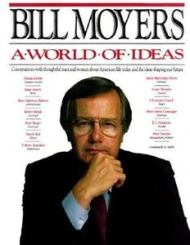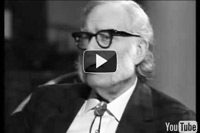 I’m deeply fascinated by how the past envisioned the future. Previously: retrofuturistic artwork, Orson Welles’s Future Shock techno-paranoia, a vision for the iPad 23 years before the iPad, Marshall McLuhan’s “global village” concept, and a living timecapsule of futurism by cultural luminaries.
I’m deeply fascinated by how the past envisioned the future. Previously: retrofuturistic artwork, Orson Welles’s Future Shock techno-paranoia, a vision for the iPad 23 years before the iPad, Marshall McLuhan’s “global village” concept, and a living timecapsule of futurism by cultural luminaries.
Now comes a brilliant bit from beloved sci-fi author Isaac Asimov, the quintessential futurist, interviewed here by Bill Moyers in 1988. Recorded upon the publication of Asimov’s 391st book, Prelude to Foundation, this three-part interview offers a rare peek inside one of history’s most fascinating minds and was eventually included in the excellent Bill Moyers: A World of Ideas (public library). Asimov shares invaluable insights on science, computing, religion, population growth and the universe, and echoes some of own beliefs in the power of curiosity-driven self-directed learning and the need to implement creativity in education from the onset.
Eventually, Asimov predicts not only the very birth of the Internet, but also a number of today’s digital darlings, from standbys like Wikipedia to experiments like Quora, as well as catchy concepts like Clay Shirky’s “cognitive surplus” — the notion that advances in technology are freeing up more human thought to be put toward creative, pro-social endeavors.
Once we have computer outlets in every home, each of them hooked up to enormous libraries where anyone can ask any question and be given answers, be given reference materials, be something you’re interested in knowing, from an early age, however silly it might seem to someone else… that’s what YOU are interested in, and you can ask, and you can find out, and you can do it in your own home, at your own speed, in your own direction, in your own time… Then, everyone would enjoy learning. Nowadays, what people call learning is forced on you, and everyone is forced to learn the same thing on the same day at the same speed in class, and everyone is different.
Sound familiar?
Moyers: But what about the argument that machines, computers, dehumanize learning?
Asimov: As a matter of fact, it’s just the reverse. It seems to me that, through this machine, for the first time we’ll be able to have a one-to-one relationship between information source and information consumer.
Sound familiar?
Science does not purvey absolute truth, science is a mechanism. It’s a way of trying to improve your knowledge of nature, it’s a system for testing your thoughts against the universe and seeing whether they match.
For more of Asimov’s cunning insight on the role of science and creativity in education, treat yourself to The Roving Mind — a compendium of 62 edifying essays on everything from creationism to censorship to the philosophy of science, in which Asimov predicts with astounding accuracy not only the technological developments of the future but also the complex public debates they have sparked, from cloning to stem-cell research.



